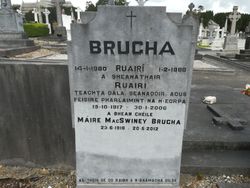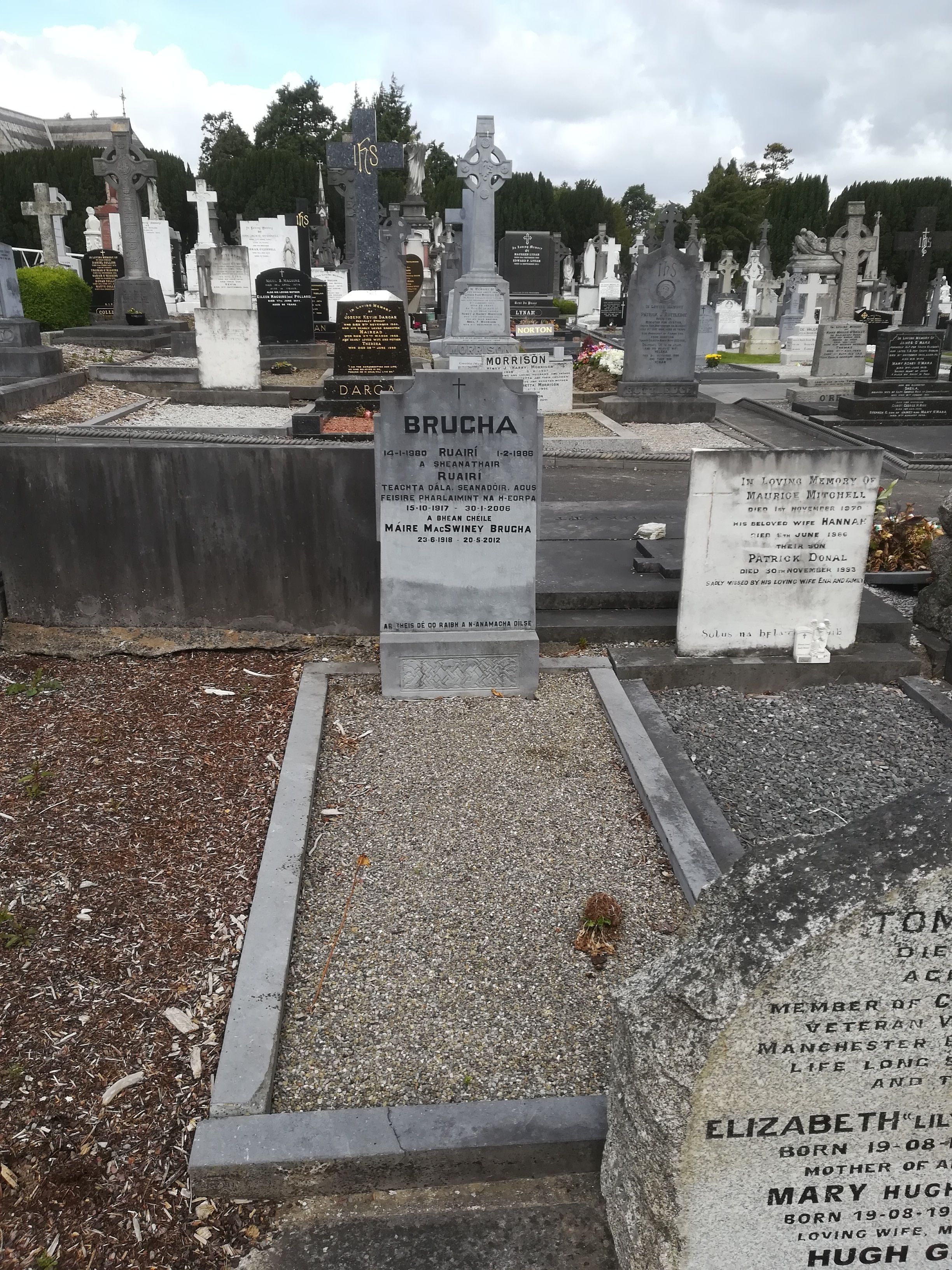Published in The Irish Times, 22 & 23 May 2012.
BRUGHA (Dublin) - May 20, 2012 (peacefully), at Belmont House Nursing Home, Máire (MacSwiney), 93 years, devoted wife of the late Ruairí, loving mother of Déirdre, Cathal, Terry and Ruairí, daughter of the late Terence MacSwiney, former Lord Mayor of Cork; sadly missed by her daughter, sons, grandchildren, great-grandchildren, son-in-law, daughters-in-law, relations and friends. Removal tomorrow (Wednesday) to the Church of St. Therese, Mount Merrion, arriving at 6 pm. Funeral Mass on Thursday at 11.30 o'clock, followed by burial in Glasnevin Cemetery.
"In iothlann Dé go gcastar sinn"
Obituary.
Published in The Irish Times, Saturday
Hunger striker's daughter whose German link led to 'dual identity'
MÁIRE MacSWINEY BRUGHA was the only child of Terence MacSwiney, former lord mayor of Cork, who died on hunger strike in 1920. She was the widow of former senator and TD Ruairí Brugha, whose father, Cathal Brugha, was killed in the Civil War in 1922.
Fianna Fáil leader Micheál Martin described her as a woman who made a "strong and valued" contribution to the development of his party while Sinn Féin president Gerry Adams said she "made her mark" on Irish history.
MacSwiney Brugha, who died aged 93, was born in Cork in 1918. Her father's first sight of her was in Crumlin Road jail, Belfast, where she was brought to visit him when she was three months old. After he returned to Cork, her parents decided they would speak only Irish to their daughter. Her father pinned a fáinne to her baby frock before she learned to speak. He died after 74 days on hunger strike when she was two years old.
In 1921 mother and daughter moved to Dublin. But Máire saw little of her mother, who was active in opposing the Treaty, and was taken into the home of Madame O'Rahilly whose husband Michael O'Rahilly died in the Rising. In 1923 her mother took her to Germany, where she was moved from place to place. Growing up, and seeing little of her mother, she spoke only German and soon forgot any Irish or English she had learned.
In 1930 she was moved to stay with a family in the Bavarian village of Grainau, where she attended secondary school. In 1931 her mother arrived to move her elsewhere but she refused and her mother left without her. Later, Máire MacSwiney, her aunt and legal co-guardian by the terms of her father's will, took her back to Ireland.
This led to a court case in which it was claimed that her aunt had "kidnapped" her. However, the young Máire was made a ward of court and custody was awarded to her aunt. Thereafter mother and daughter were estranged.
Máire attended Scoil Íte, a lay school run by her MacSwiney aunts, and later attended St Louis convent, Monaghan. She sat her Leaving Certificate in 1936 and won a scholarship to University College Cork.
She was an arts student and in 1938 spent the summer in Berlin to refresh her German. She graduated with a first-class honours degree, followed by the HDip and a German-Irish studentship.
Having taught at Scoil Íte, in 1942 she travelled to Dublin to study for an MA. By 1944 she and Ruairí Brugha were "doing a line" and in 1945 they were married. She devoted herself to being a fulltime housewife and mother; her husband worked in the family business, Kingstons. They had one daughter and three sons. Parents and children spent holidays in their Kerry cottage every August. And they enjoyed holidays in France.
She backed her husband throughout his political career – as a senator, as a TD, when he was Fianna Fáil spokesman on Northern Ireland and as a member of the European Parliament.
During the Troubles the couple attended meetings of the Irish Association and made good friends in Belfast, many of them unionists. They also came to understand the position of republicans in the North.
MacSwiney Brugha was president of her Fianna Fáil cumann in south Dublin and former secretary of aid agency Gorta.
In her memoir she wrote: "I never lost my love of Germany and its language and I have never regretted my upbringing or my life in Germany . . . Mine was a dual identity: I always felt partly German, yet wholly, deeply committed to Ireland."
She was happy with family life and encouraged her children to exploit their talents, but regretted not pursuing an academic career, which she believed would have been immensely enjoyable.
She is survived by her daughter Déirdre and sons Cathal, Terry and Ruairí.
Published in The Irish Times, 22 & 23 May 2012.
BRUGHA (Dublin) - May 20, 2012 (peacefully), at Belmont House Nursing Home, Máire (MacSwiney), 93 years, devoted wife of the late Ruairí, loving mother of Déirdre, Cathal, Terry and Ruairí, daughter of the late Terence MacSwiney, former Lord Mayor of Cork; sadly missed by her daughter, sons, grandchildren, great-grandchildren, son-in-law, daughters-in-law, relations and friends. Removal tomorrow (Wednesday) to the Church of St. Therese, Mount Merrion, arriving at 6 pm. Funeral Mass on Thursday at 11.30 o'clock, followed by burial in Glasnevin Cemetery.
"In iothlann Dé go gcastar sinn"
Obituary.
Published in The Irish Times, Saturday
Hunger striker's daughter whose German link led to 'dual identity'
MÁIRE MacSWINEY BRUGHA was the only child of Terence MacSwiney, former lord mayor of Cork, who died on hunger strike in 1920. She was the widow of former senator and TD Ruairí Brugha, whose father, Cathal Brugha, was killed in the Civil War in 1922.
Fianna Fáil leader Micheál Martin described her as a woman who made a "strong and valued" contribution to the development of his party while Sinn Féin president Gerry Adams said she "made her mark" on Irish history.
MacSwiney Brugha, who died aged 93, was born in Cork in 1918. Her father's first sight of her was in Crumlin Road jail, Belfast, where she was brought to visit him when she was three months old. After he returned to Cork, her parents decided they would speak only Irish to their daughter. Her father pinned a fáinne to her baby frock before she learned to speak. He died after 74 days on hunger strike when she was two years old.
In 1921 mother and daughter moved to Dublin. But Máire saw little of her mother, who was active in opposing the Treaty, and was taken into the home of Madame O'Rahilly whose husband Michael O'Rahilly died in the Rising. In 1923 her mother took her to Germany, where she was moved from place to place. Growing up, and seeing little of her mother, she spoke only German and soon forgot any Irish or English she had learned.
In 1930 she was moved to stay with a family in the Bavarian village of Grainau, where she attended secondary school. In 1931 her mother arrived to move her elsewhere but she refused and her mother left without her. Later, Máire MacSwiney, her aunt and legal co-guardian by the terms of her father's will, took her back to Ireland.
This led to a court case in which it was claimed that her aunt had "kidnapped" her. However, the young Máire was made a ward of court and custody was awarded to her aunt. Thereafter mother and daughter were estranged.
Máire attended Scoil Íte, a lay school run by her MacSwiney aunts, and later attended St Louis convent, Monaghan. She sat her Leaving Certificate in 1936 and won a scholarship to University College Cork.
She was an arts student and in 1938 spent the summer in Berlin to refresh her German. She graduated with a first-class honours degree, followed by the HDip and a German-Irish studentship.
Having taught at Scoil Íte, in 1942 she travelled to Dublin to study for an MA. By 1944 she and Ruairí Brugha were "doing a line" and in 1945 they were married. She devoted herself to being a fulltime housewife and mother; her husband worked in the family business, Kingstons. They had one daughter and three sons. Parents and children spent holidays in their Kerry cottage every August. And they enjoyed holidays in France.
She backed her husband throughout his political career – as a senator, as a TD, when he was Fianna Fáil spokesman on Northern Ireland and as a member of the European Parliament.
During the Troubles the couple attended meetings of the Irish Association and made good friends in Belfast, many of them unionists. They also came to understand the position of republicans in the North.
MacSwiney Brugha was president of her Fianna Fáil cumann in south Dublin and former secretary of aid agency Gorta.
In her memoir she wrote: "I never lost my love of Germany and its language and I have never regretted my upbringing or my life in Germany . . . Mine was a dual identity: I always felt partly German, yet wholly, deeply committed to Ireland."
She was happy with family life and encouraged her children to exploit their talents, but regretted not pursuing an academic career, which she believed would have been immensely enjoyable.
She is survived by her daughter Déirdre and sons Cathal, Terry and Ruairí.
Family Members
Sponsored by Ancestry
Advertisement
Records on Ancestry
Sponsored by Ancestry
Advertisement






